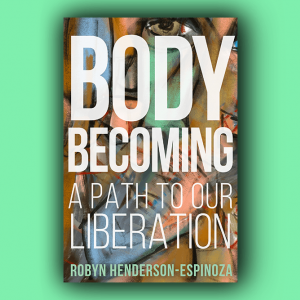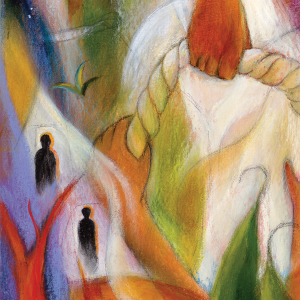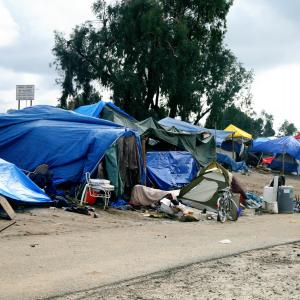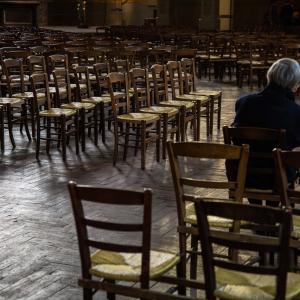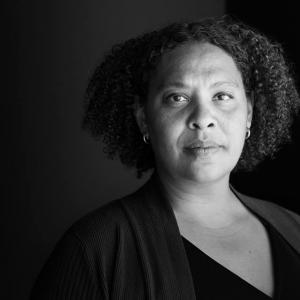
Roberto Che Espinoza, Ph.D., is a transqueer activist, Latinx scholar, and public theologian. They are the founder of the Activist Theology Project, a collaborative project committed to the collective work of social healing.
Posts By This Author
In the U.S., Christians Have Discounted the Body for Too Long
In leaving the church, earning a Ph.D., coming to terms with who I am as a NonBinary Transgender Latinx, dosing testosterone each week, deepening my antiracist awareness, and learning about embodiment, I’ve encountered a lot of change.
‘Like Thomas, I Don't Always Believe’
We think of Thomas as the one who doubted, but his story shows us what faith looks like.
LAST YEAR I went on my first cruise. Joined by my favorite kinfolk, I caught up on my rest, sampled craft beer, and enjoyed some really great food. As the boat made its way to the Caribbean and Cayman Islands, I attended a performance by Delta Rae, a rock and folk band with Southern roots and a flair for storytelling. I was moved by many of the songs they performed that night, but it was their song “Hands Dirty” that stayed with me long after we disembarked.
The song gives voice to a woman who, like many in the service industry, works hard but doesn’t catch a break. In the chorus, vocalists Brittany Hölljes and Liz Hopkins sing:
I get my hands dirty
I show up so early
They show me no mercy
So I just keep working
Maybe God could save me
In this song I heard someone whose work had never been recognized. I heard echoes of all the ways our society has continually undervalued women’s labor—especially the labor of women of color, who are disproportionately marginalized in the workforce. Yet even as this woman experienced the sharp end of capitalism’s stick, the song made it clear she wasn’t giving up; she was going to keep working, imagining the future could be different. And as I listened, I thought: Isn’t that our work right now—to get our hands dirty? To imagine a different way of being and becoming, take a leap of faith, dig deep, and roll up our sleeves? And, if that is our work, do we have the courage to do it?
How the Logic of Dominance Is Threatening Berkeley’s Homeless Encampments
On Oct. 21, that same intentional Berkeley housing encampment — which has peacefully existed in its current location for the last nine months, was served a 72-hour eviction notice by the Bay Area Rapid Transit (BART) police by request from the City of Berkeley. Despite receiving over 3 million dollars in grants to expand housing, the City of Berkeley invests more of its time and resources displacing marginalized communities.
The Silent Stigma of Mental Illness in the Church
If one of our greatest social sins is the lack of access to mental health care, it is a moral imperative begin a discourse around mental health in our faith communities.
This Is My Body
What do our bodies—dreadlocks, muscles, thighs, and all—teach us about God?
ON DEC. 10, 2015, shortly after then-candidate Donald Trump suggested a “total and complete shutdown” of Muslim immigration, Wheaton College professor Larycia Hawkins wrapped a hijab around her head, snapped a selfie, and posted the photo on Facebook. “I stand in religious solidarity with Muslims because they, like me, a Christian, are people of the book,” wrote Hawkins in the post. “And as Pope Francis stated last week, we worship the same God.”
It was a costly act for Hawkins: Three months later, following a controversy about whether she had violated the evangelical school’s statement of faith, she was no longer a tenured professor at Wheaton. But Hawkins doesn’t regret what she did. As she sees it, true solidarity—she calls it “embodied solidarity”—always comes with a cost.
When it comes to bodies and the church, Christians often start with St. Augustine. Though the esteemed fourth century bishop of Hippo spent a full decade debunking the dualistic heresy that material bodies were evil, he remained famously skittish about fleshy influence on the soul. By Augustine’s reading of scripture, bodies weren’t inherently wicked, but they sure were weak—especially female bodies—and you had to watch ’em or God-only-knows what kind of sinful depravity might creep in. He often quoted the Book of Wisdom: “the corruptible body weighs down the soul and the earthly tabernacle presses down the mind that muses upon many things.” And you don’t have to be a church-history expert to trace the devastating legitimacy Augustine’s ideas gave to misogyny and other forms of body-based oppression in Christianity.
Yet as Christians in every generation have countered, we can’t write bodies off so easily. After all, smack dab in the middle of our confession of faith is a savior who suffered bodily, was crucified, and rose again. What’s more, this same savior was known for saying that love is laying down your life, and how we treat others is ultimately how we treat God. “‘Suffering with’ requires our entire bodies,” Hawkins later explained. “Suffering from a distance is not solidarity. Theoretical solidarity is not solidarity at all.”
Sojourners asked six Christian writers and theologians: What does your body tell you about God? Not bodies in the abstract, but your body: pimples, dreadlocks, muscles, belly buttons, wrinkles, thighs, and all. And though it might sound like an exercise in navel- gazing sure to make Augustine roll over in his grave, the responses we received say a lot about the carne part of incarnation: the radical solidarity of a God who took on flesh. - The Editors
Resisting the Logic of Dominance in Our Police Forces
This is another form of racialized terror for a black woman to endure. Our call in this 21st century is to be faithful in the small things, follow the ways of Jesus, and resist empire and oppressive systems at all cost. This is the cost of discipleship, as Dietrich Bonhoeffer teaches. The active resistance to systems that perpetuate terror and oppression is what we are called to do. This is part of being faithful in the small things: resisting systems that perpetuate the logic of dominance and that do not conform to the eschatological hope of collective liberation.
Orlando's Intersections: May Our Differences Stretch Us to Revolutionary Love

Image via Alisdare Hickson/Flickr
Being unified in our differences does not suggest a singularity of identity or privilege the normalization of one identity over another. We must find earnest ways to harness our imagination to live into a moral excellence that is at root the active affirmation of the differences of one another. This is seen in affirming Muslim identities, queer identities, Christian identities, and Latin@ identities simultaneously.
We have to stretch with the differences that are pushing us into new contours of relationality, that motivate revolutionary love.
